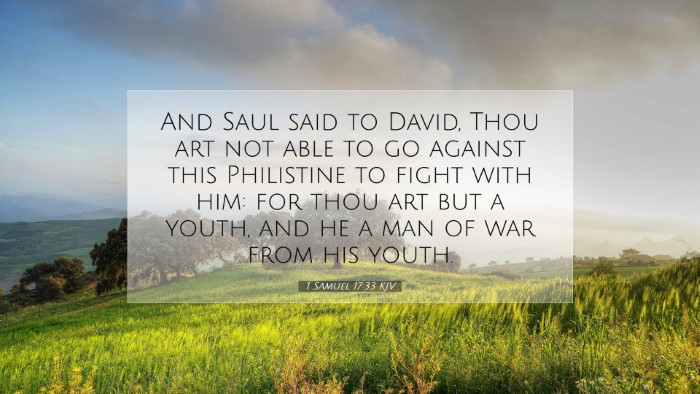Old Testament
Genesis Exodus Leviticus Numbers Deuteronomy Joshua Judges Ruth 1 Samuel 2 Samuel 1 Kings 2 Kings 1 Chronicles 2 Chronicles Ezra Nehemiah Esther Job Psalms Proverbs Ecclesiastes Song of Solomon Isaiah Jeremiah Lamentations Ezekiel Daniel Hosea Joel Amos Obadiah Jonah Micah Nahum Habakkuk Zephaniah Haggai Zechariah MalachiChapter
1 Samuel 1 1 Samuel 2 1 Samuel 3 1 Samuel 4 1 Samuel 5 1 Samuel 6 1 Samuel 7 1 Samuel 8 1 Samuel 9 1 Samuel 10 1 Samuel 11 1 Samuel 12 1 Samuel 13 1 Samuel 14 1 Samuel 15 1 Samuel 16 1 Samuel 17 1 Samuel 18 1 Samuel 19 1 Samuel 20 1 Samuel 21 1 Samuel 22 1 Samuel 23 1 Samuel 24 1 Samuel 25 1 Samuel 26 1 Samuel 27 1 Samuel 28 1 Samuel 29 1 Samuel 30 1 Samuel 31Verse
1 Samuel 17:1 1 Samuel 17:2 1 Samuel 17:3 1 Samuel 17:4 1 Samuel 17:5 1 Samuel 17:6 1 Samuel 17:7 1 Samuel 17:8 1 Samuel 17:9 1 Samuel 17:10 1 Samuel 17:11 1 Samuel 17:12 1 Samuel 17:13 1 Samuel 17:14 1 Samuel 17:15 1 Samuel 17:16 1 Samuel 17:17 1 Samuel 17:18 1 Samuel 17:19 1 Samuel 17:20 1 Samuel 17:21 1 Samuel 17:22 1 Samuel 17:23 1 Samuel 17:24 1 Samuel 17:25 1 Samuel 17:26 1 Samuel 17:27 1 Samuel 17:28 1 Samuel 17:29 1 Samuel 17:30 1 Samuel 17:31 1 Samuel 17:32 1 Samuel 17:33 1 Samuel 17:34 1 Samuel 17:35 1 Samuel 17:36 1 Samuel 17:37 1 Samuel 17:38 1 Samuel 17:39 1 Samuel 17:40 1 Samuel 17:41 1 Samuel 17:42 1 Samuel 17:43 1 Samuel 17:44 1 Samuel 17:45 1 Samuel 17:46 1 Samuel 17:47 1 Samuel 17:48 1 Samuel 17:49 1 Samuel 17:50 1 Samuel 17:51 1 Samuel 17:52 1 Samuel 17:53 1 Samuel 17:54 1 Samuel 17:55 1 Samuel 17:56 1 Samuel 17:57 1 Samuel 17:58

